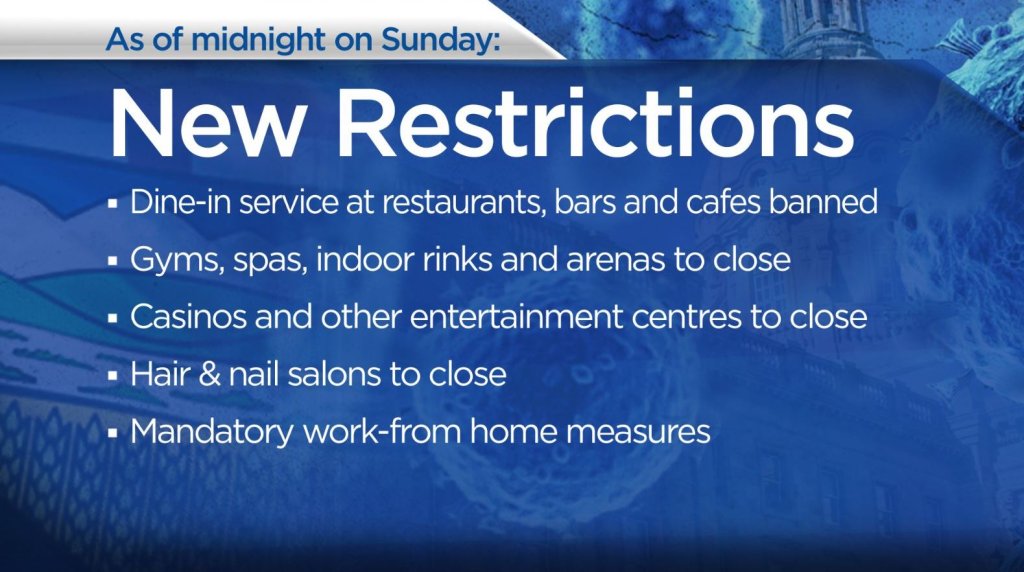On Tuesday, Alberta announced new COVID-19 safety restrictions ordering casinos and gyms to close and banning dine-in service at restaurants, bars and cafes effective Sunday, Dec. 13.
Ernie Tsu, owner of Trolley 5 Restaurant and Brewery and founding board member of the Alberta Hospitality Association, was disappointed to hear about the new restrictions. He believes bars, restaurants and lounges are being penalized again, while other businesses are being allowed to stay open.
“For a lot of restaurants out there right now, it’s very unfortunate, they’re barely hanging on and this is going to be a very tough time for them,” Tsu said.
“But more importantly, it’s going to be a tough time for our staff. Our staff that do not have the ability to work from home and quite frankly, won’t have a paycheque to go home to leading into Christmas.”
Kris Harvey is the owner of Edmonton concert venue, The Chvrch of John, and said the hospitality industry is feeling frustrated and like their voices are not being heard by the province.
“Regardless of how much they say we’re the experts and we can write the protocols, they haven’t listened to hospitality experts.”
“We’ve created safe environments and done everything, jumped through every single hoop we’ve been asked for with very minimal or no support and now with the last three weeks, the protocols were just mindless, they were half-assed,” Harvey said.
Read more:
Alberta’s new COVID-19 measures ban in-person dining, outdoor gatherings; retail to remain open

The province also announced that retail businesses, including malls, will be allowed to remain open but face further capacity limits, reduced from 25 per cent to 15 per cent of the occupancy allowed under the fire code.
Premier Jason Kenney said the decision to allow all retail to remain open, not just essential services, was made to ensure small and medium Alberta-owned businesses would not be affected unfairly.
“In the spring we had this crazy situation, of hundreds of people jamming into big U.S.-owned big-box stores, often buying goods that would normally be available from small specialty retailers in Alberta,” Kenney said.
“We’ve decided not to make that mistake a second time. To learn from that mistake.
“Every business is essential for the person who owns that business and the people who work there,” he said. “And that’s something we should not lose sight of again.”
While some businesses are relieved their doors can open this holiday season, others have suggested the limited capacity will make it harder and sales have already taken a dramatic hit.
President and CEO of the Alberta Chambers of Commerce Ken Kobly said he believes the effect and consequences of these new restrictions on small businesses could be devastating.
“You’d likely see a number of small businesses simply not reopening.”
“It is very difficult at this point in time, because we’ve had, what? eight months now of this thing, varying degrees of cash flow and headed into what is normally the month that actually helps businesses survive in January and February,” Kobly said.
Read more:
Alberta eases close-contact determination for school staff after COVID-19 exposure
Annie Dormuth, the director of provincial affairs with the Alberta at Canadian Federation of Independent Business, said retail locations being allowed to remain open will ensure fairness amongst businesses. Closing small businesses, she said, will push consumers to “rush and flock to big box stores.”
“So it is good news that the government has found a pathway to allow retail businesses to maintain operations at a reduced capacity, and that really gives them the opportunity to survive through the holiday season,” Dormuth said.
Read more:
New research suggests Alberta COVID-19 R value currently too high to lift restrictions
In order to help ease some of the stress on business in Alberta, the province announced on Tuesday that it is expanding and increasing the Small and Medium Enterprise Relaunch Grant. The changes will lower the threshold and bump up the grant amount, which should extend funding relief to around 15,000 more eligible businesses.
“Our small businesses need additional supports, and they need them today – that’s why we’re taking action now to increase the funding available to our local job creators,” Minister of Jobs, Economy and Innovation Doug Schweitzer said.
“We’ve tripled our support to get job creators the help they need so we can come out of this pandemic stronger than before. Alberta’s government is here for our small businesses while we protect the lives and livelihoods of all Albertans.”
A full list of affected businesses and services can be found at alberta.ca.